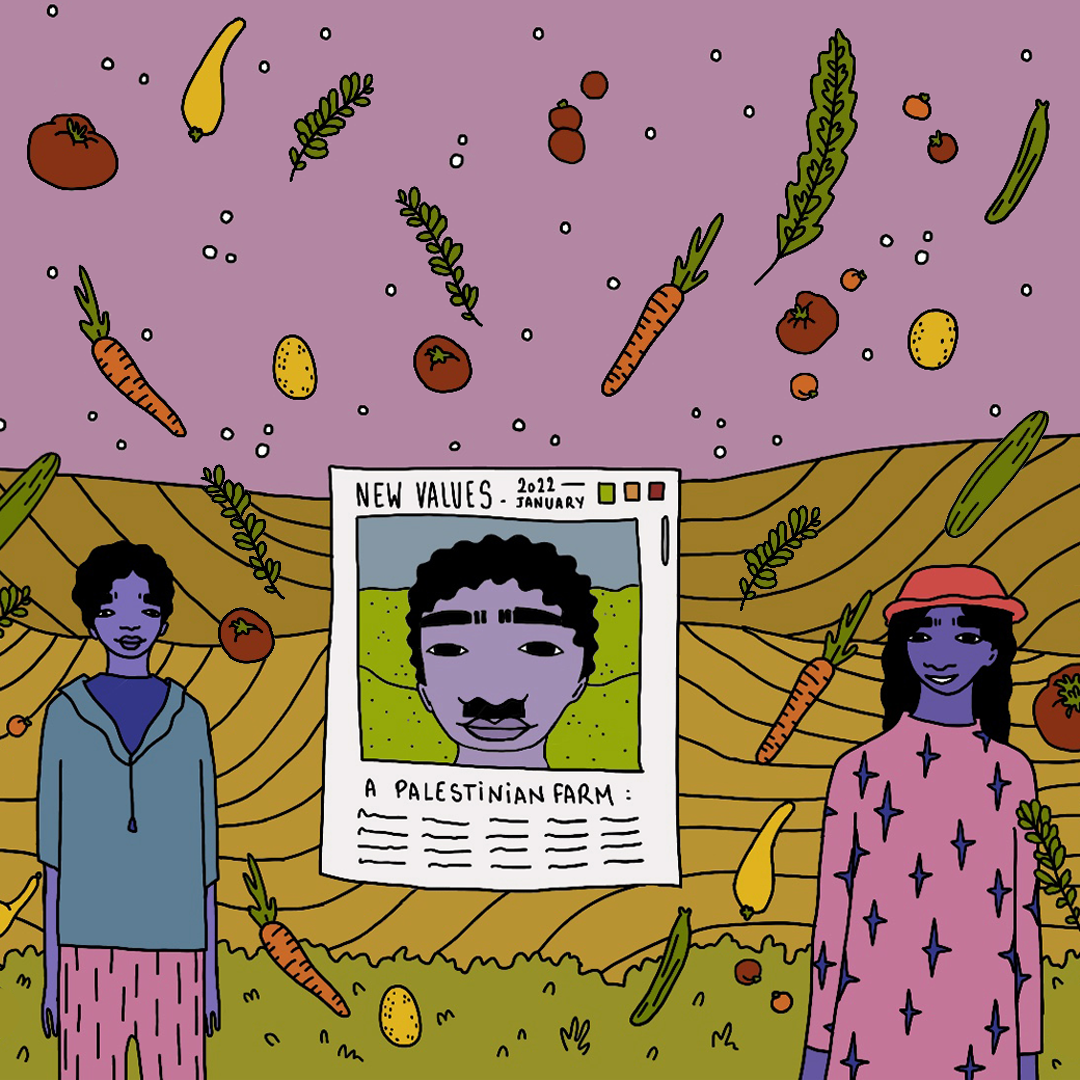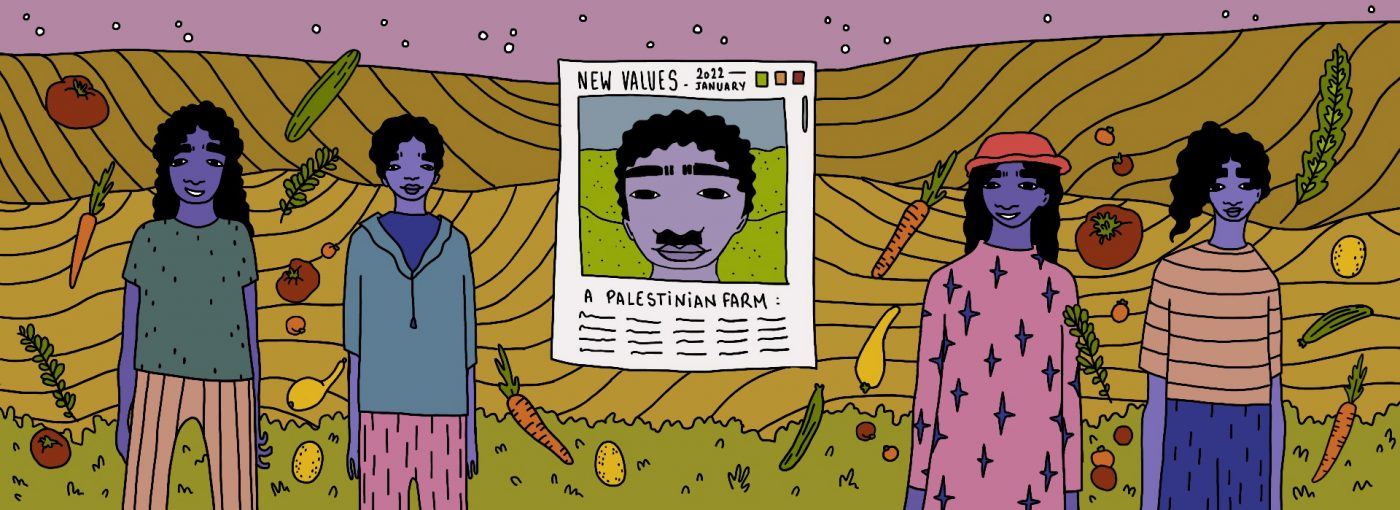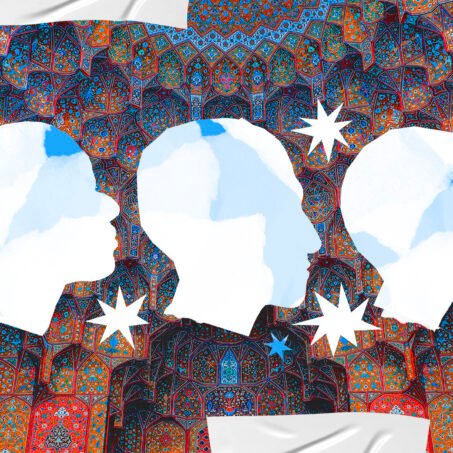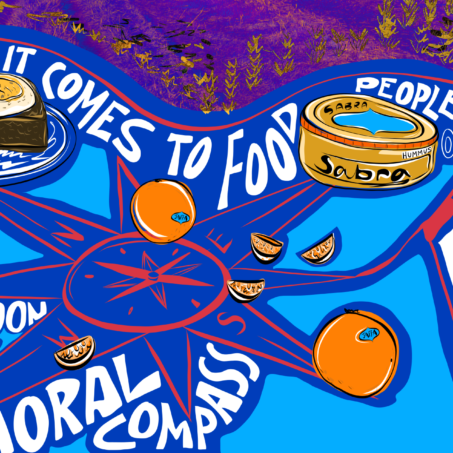It was one of those days that my phone didn’t stop ringing. “Hello, Om Sleiman?” – I’d lost count of the times I repeated this greeting.
Om Sleiman is the community supported agriculture farm I have managed for the last four years. It translates literally as ‘the mother of Sleiman’, but in our case it means ladybug, the insect that we’re always happy to see in the farm; a pest manager offered by nature.
We often get calls from people looking to do photoshoots with our farmers and on this particular call I asked: “Do you want a woman or a man?” It took him by surprise. “Oh, I didnt know there were Palestinian women farmers…”
What should have been a two minute call turned into a twenty minute lecture by me about sexism, farming, colonisation, and patriarchy. The caller clearly wanted out. He agreed to see both male and female farmers and would give the company he worked for the two options.
The misogyny faced by female farmers
Unfortunately, this reaction didn’t take me by surprise. I’ve spent the last few years working as a farmer in a village. People rarely consider Palestinian women as farmers, and when they do, one usually imagines an image of an older woman from a rural village in folklore dress, her children around her as she works in the field.
But there are women who are defying this stereotype – and I’m one of them. And especially being a young city girl, I’ve come up against these narrow-minded ideas many times before. .
Working on a farm means you have to wear many hats. You need to be a plumber, builder, welder and carpenter – all of which are traditionally male roles. The gendered domination of these industries is made crystal clear when I am ordering the materials for my farm and met with disbelief.
After some awkward dialogue, during which my gender and pronoun are correctly asserted, an irreverent tone takes over the conversation. It’s assumed I don’t know what I need, and suggested that I should bring a male colleague.
However, as our female-run farm has grown, gradually so has the respect for me in these places. I just wish this was the case across Palestine.
A long history of women farmers
Incongruously, despite these prevailing sexist attitudes towards female farmers, our numbers have been growing over the last few decades and currently women in Palestine carry out 54% of agricultural production and 87% of all agricultural animal production.
This is due to the overarching decrease of Palestinian farmers. In the last few decades the percentage of the Palestinian farming population has dropped from 60% to just 13%. This is mainly due to the Israeli occupation and the restrictions imposed on us.
Land grabbing, access to water, the burning of our olive trees and competition with Israeli mono-culture products all inhibit our practices. And the Palestinian Authority has only made this problem worse by industrialising the sector and supporting big companies rather than organic or even small scale farms.
Because of Israeli destruction and domination of the industry, farmers are forced to leave their land to seek out a better source of income. And because of a prevailing patriarchal social attitude, it is mostly the men who go on to find more profitable jobs, leaving the women responsible for the farms, often without the recognition.
When men do stay working in agriculture, women become invisible. This is due to men being responsible for the first and last steps of the production cycle, ploughing and selling. While women, responsible for the seeding, planting, harvesting and processing of the products, are left unrecognised and largely unpaid. Reports done by UWAC show that most of the 40,000 female farmers in Palestine don’t receive payment, despite being responsible for more than 70% of the agriculture production.
What the consumer never sees is the effort of trellising your cucumber in a greenhouse in the heat of summer, the ache of losing a crop and finding no compensation, the frustration when a merchant who will go on to sell your wares negotiates with you on the price of cauliflower, something you cared for for five months and he wants to buy it for less than a dollar.
Prior to Israeli market domination this wasn’t the case and these now male dominated spaces such as markets used to be occupied by female farmers or bedouin selling their wares.
The reality of working on a farm
The erasure of recognition of female farmers becomes all the more frustrating when you realise how hard the work is.
Before I came to Om Sleiman, I wasn’t aware of the hardships that being a farmer would entail. I just thought it would be cool to be in the field; planting,harvesting and enjoying the sunny weather. But when I started working from sunrise to sunset in temperatures that ranged from a scorching 35 down to 5 degrees celsius, I realised just how tough the lives of farmers are.
It made me value the work that farmers do, and now I never negotiate with a farmer on the price of an item. It made me question all the products I buy, where they come from and how they get to the shelves of the shops.
Change from the ground up
At Om Sleiman, where women make up the majority of our team, we follow a direct farm-to-consumer model, where the farmer decides the price and has direct communication with the consumers.

Join our mailing list
Sign up for shado's picks of the week! Dropping in your inbox every Friday, we share news from inside shado + out, plus job listings, event recommendations and actions ✊
Sign up for shado's picks of the week! Dropping in your inbox every Friday, we share news from inside shado + out, plus job listings, event recommendations and actions ✊
We aim to give women the recognition they deserve. Not only do the women lead the work at the farm itself, we also collaborate with women from the village to process surplus products.
By encouraging women to take on all roles from plumbing to building, we leave no space for sexist attitudes. We also run workshops on the importance of natural farming. By engendering an atmosphere that has allowed women to occupy the majority of this space, we show that it is women who are safeguarding the future of the industry.
Om Sleiman gave me the space to become who I want to be and learn skills that I wouldn’t otherwise have been able to. Being able to grow my own food has also given me so much freedom and empowerment – and this is something I want to give to other women, too.
Farming as resistance
Farming is also a crucial part of our resistance as Palestinians. To be able to produce, despite the minimal resources the Israli occupation has left us, and to offer a space for community knowledge sharing, is to resist and combat an oppressive system which wants to erase our existence.
Om Sleiman offers a model that other people can adopt to help build the Palestine we dream of. By centring women we contribute to movements of food sovereignty which are so important to our Palestinian self-determination.
Of course the advertisement company that called me came to the farm and ended up taking pictures of my male colleague only. His picture was hung on big banners all over the city for three months. What would have happened if at that moment he had decided to instead grant women the recognition they deserve, both as bodies safeguarding farming for future generations and beings playing a vital role in Palestinian resistance?
What can you do?
- Listen to this podcast on sustainable farming practices within palestine
- Read this article on farming as resistance, this on food sovereignty in Palestine and this on how Ramadan highlights the importance of food.
- Watch these documentaries on our farm
Read more stories from Palestine:
- Decolonisation on (in) the Ground: Farming as Colonial Resistance in Palestine – Shado Magazine
- The violence in Palestine and Colombia is systemically linked to Western imperialism – Shado Magazine
- There is nothing complicated about the situation in Palestine – Shado Magazine
Follow and volunteer at
- Om Sleiman farm
- Sakiyaorg
- Mohammad_Khweirah’s “Al Fallah farm”
- Romanaa_20211- A nursery run by a women cooperative




